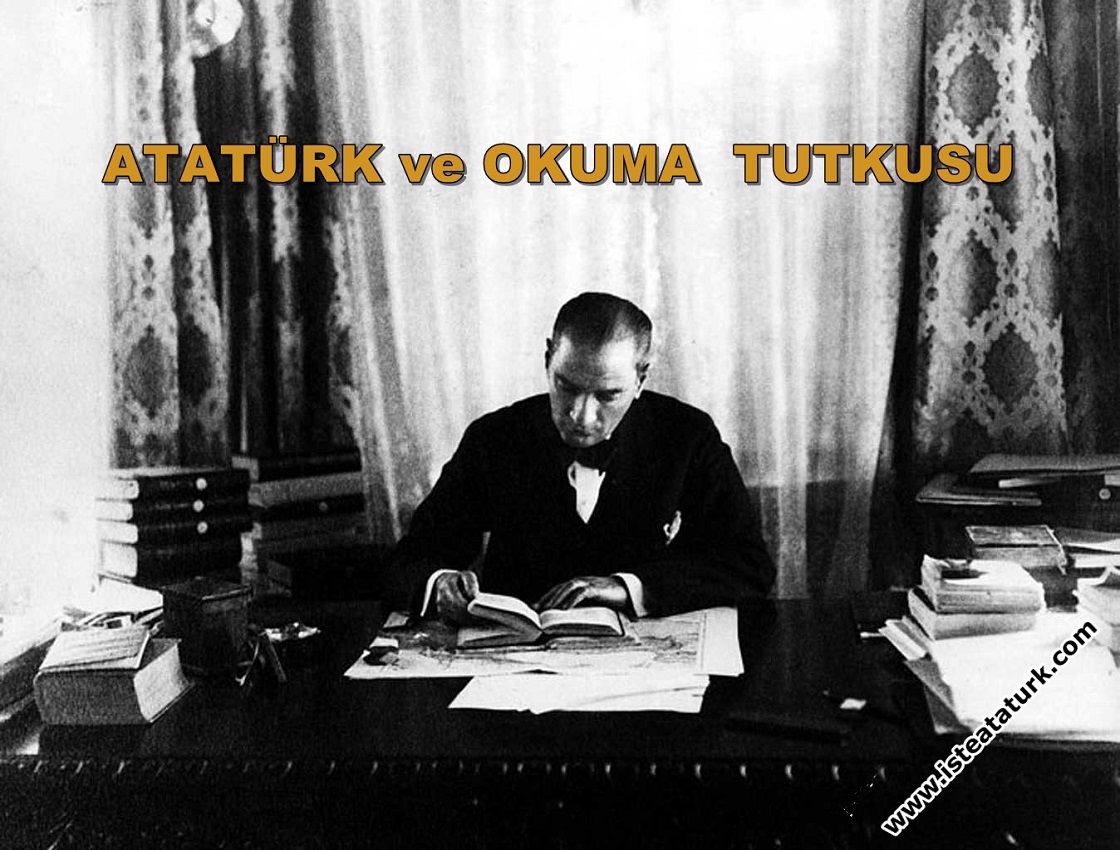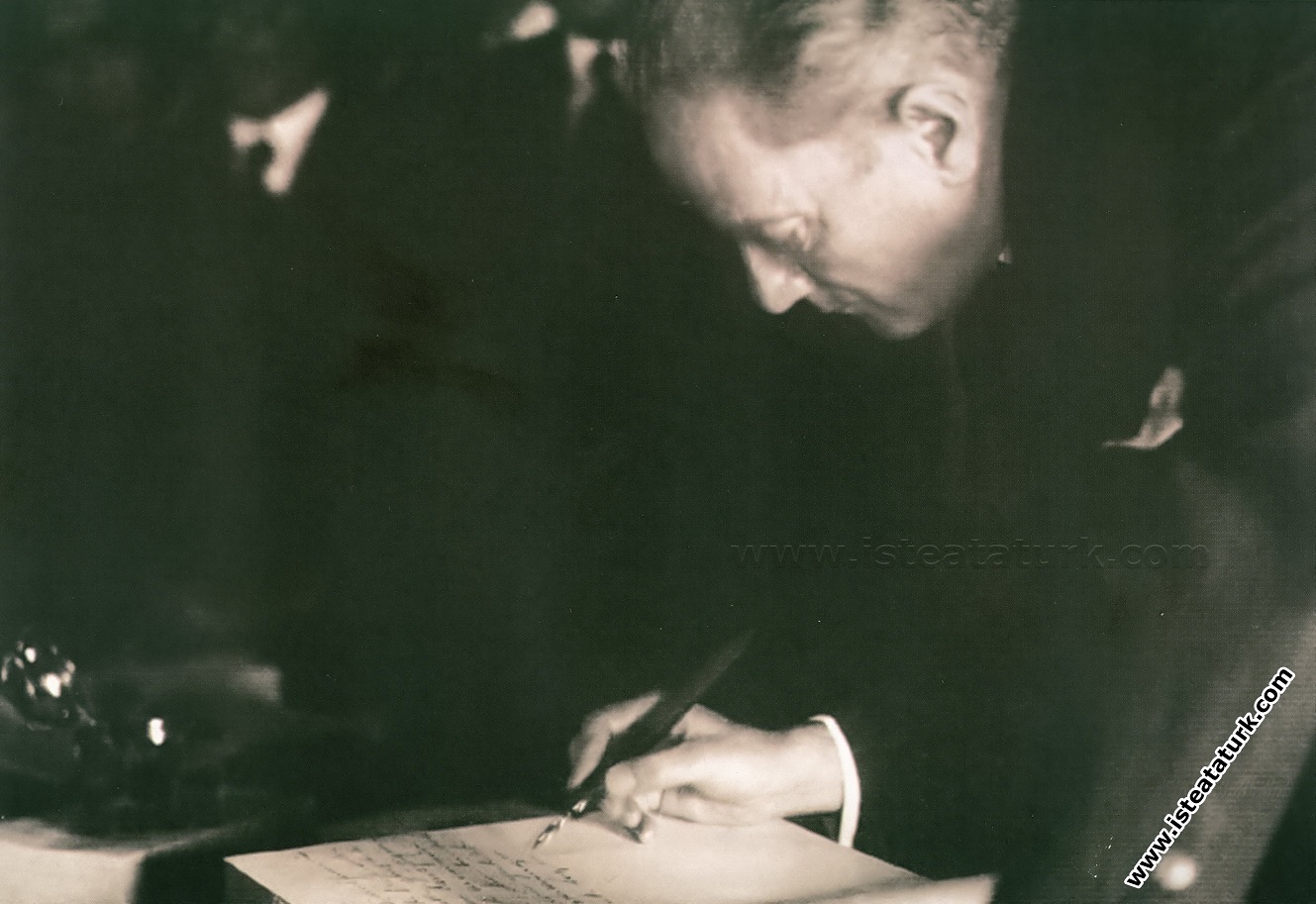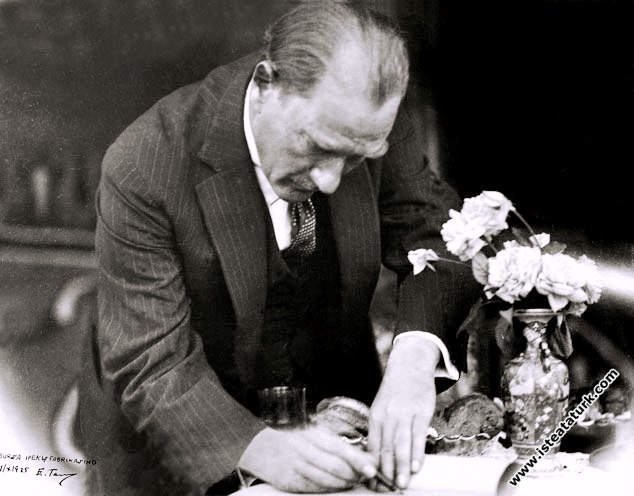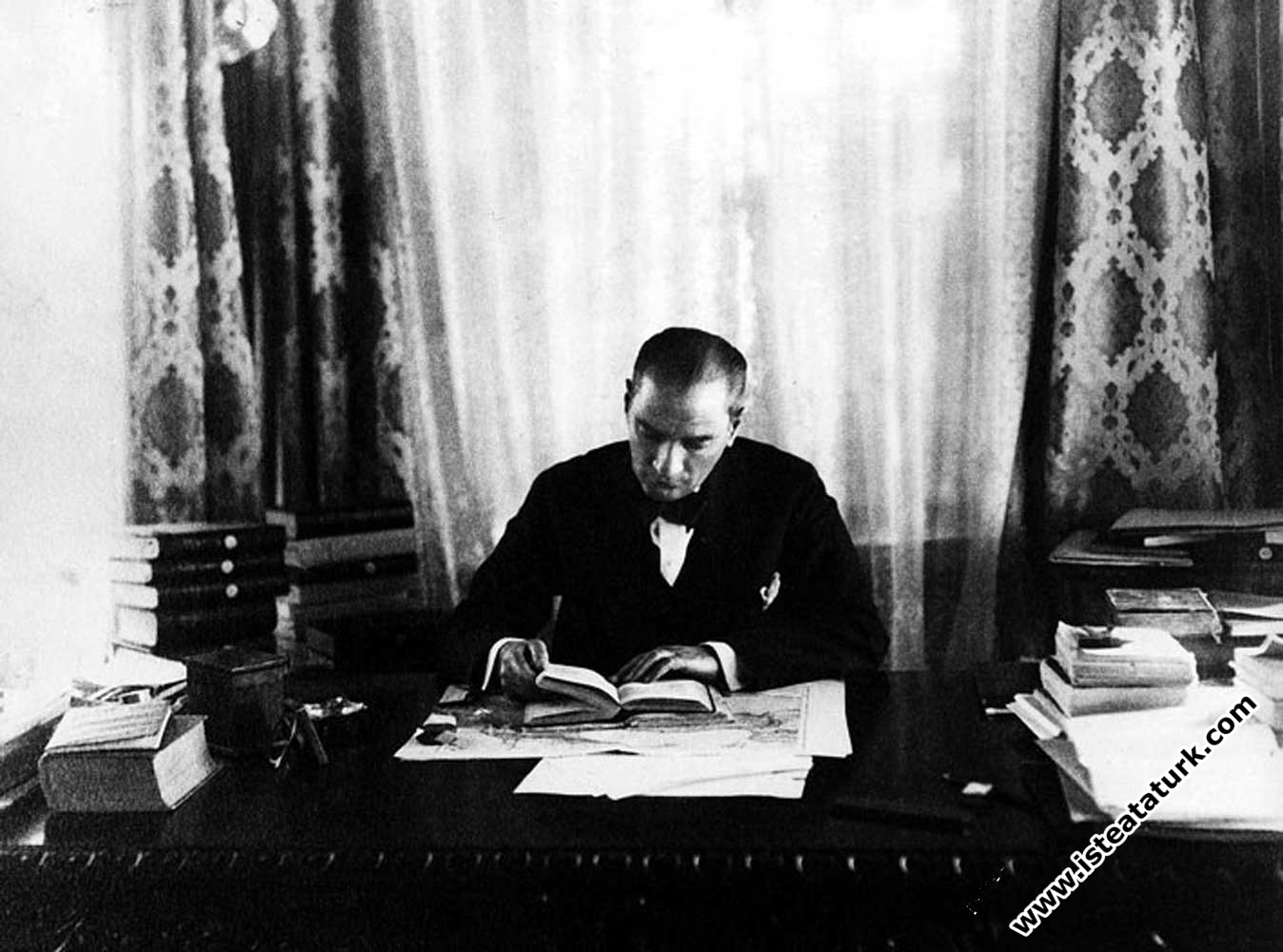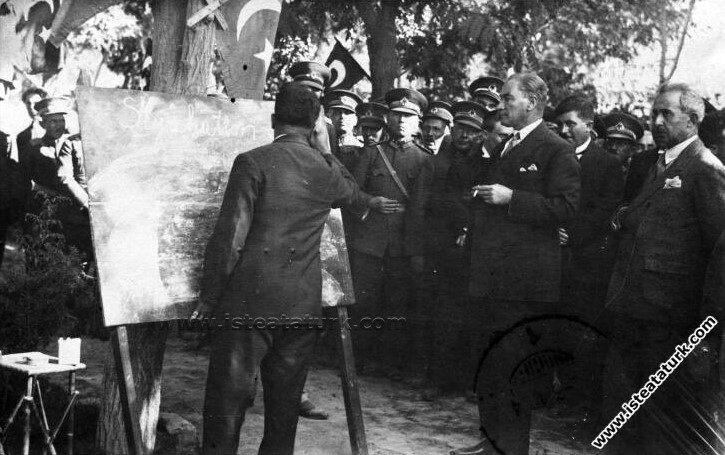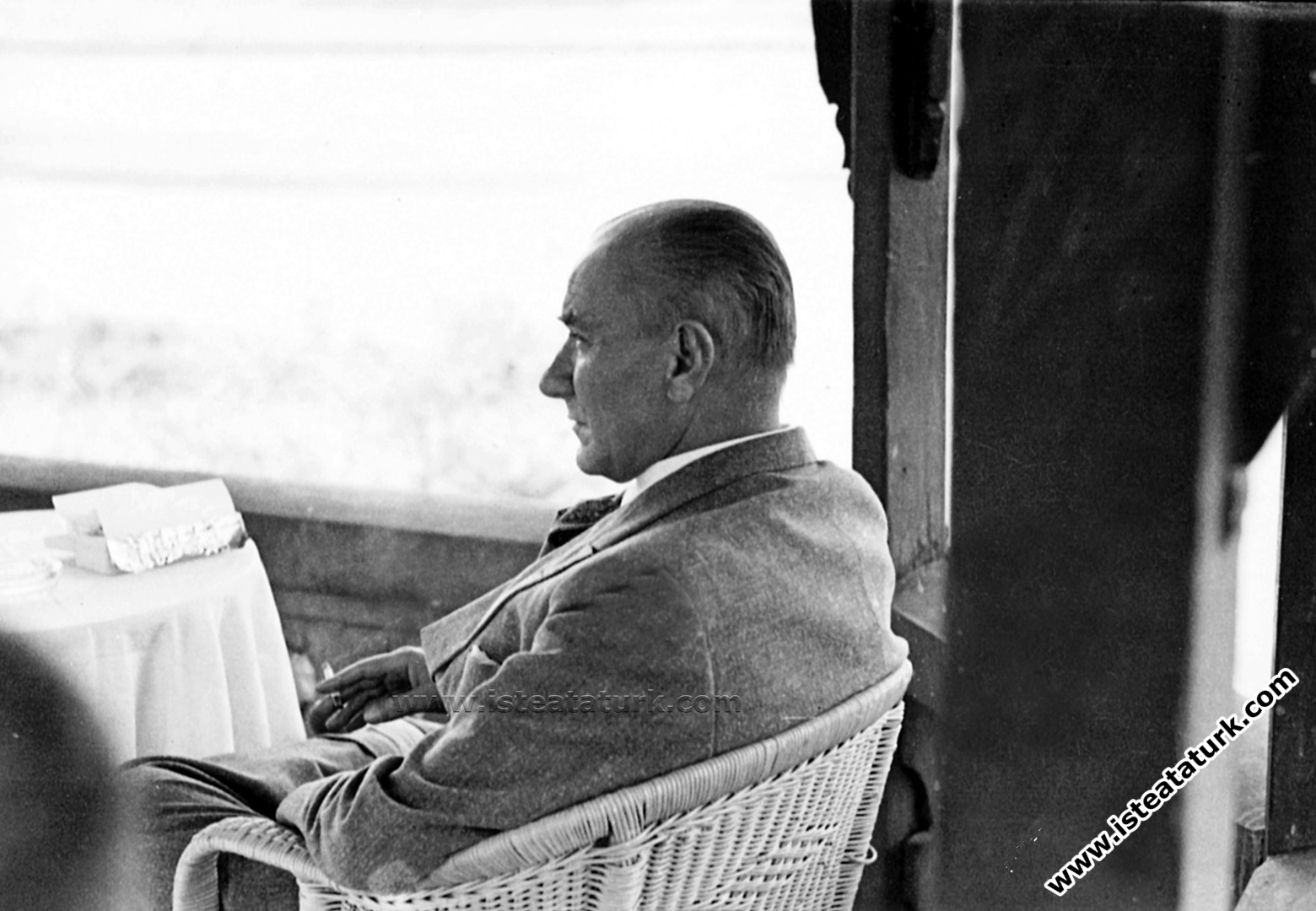
The Intellectual Life of Mustafa Kemal Atatürk
Character Size
The Intellectual Life of Mustafa Kemal Atatürk
The Intellectual Life of Mustafa Kemal Atatürk
"Teachers alone and only save nations." Atatürk, who said, gave great importance to education and training issues.
When he said, "The truest guide in life is science", M. Kemal, who expressed that science can guide and illuminate life with the word guide (correct guide), why did he feel the need to add the adjectives "the most genuine" by not being contented with that? While reading this sentence and thinking about it, one will not be able to pass without hesitation on the words "the most genuine".
M. Kemal used to say that when he learned the positive sciences of his own upbringing in terms of his professional expertise, he could have a clear and positive view and aimed to settle any profession with austerity (mathematical) precision.
The influence of M. Kemal's upbringing, education life and social environment encouraged him to read. In every phase of his life, the book is the most valuable asset for him.
"Science and science will be our guide in our nation's political and social life and in our nation's intellectual upbringing." When he said that, he always emphasized the same principles. His speeches and words always sparked a movement of opinion, because he benefited from the publications of his time and always loved the discussions of an intellectual milieu.
Examining the signs on the books Atatürk read yields very interesting results. The examples I will give in this part of my book are Atatürk's studies on certain subjects. I would like to take this opportunity to determine the topics discussed around Atatürk and his thoughts on various issues.
Meetings around Atatürk are always mentioned. Those present here wrote their memoirs according to their own views. Historians and writers, on the other hand, want to write these meetings according to the conclusions they have drawn from what they have heard or read.
As I have witnessed, the gatherings around Atatürk are very diverse. During the day, he would often either work with a few people in his private library or talk on a particular topic. These continued on car or motorcycle rides, and they would often talk about certain issues directly with the guests or the people gathered there in farmhouses in Ankara and ask their opinions.
This situation was applied more intensely in his domestic travels, he liked that he always had discussions by explaining the researches on new subjects and problems of the country, on the train, on the ferry and wherever he visited. Atatürk's daily intellectual life always found a field of practice in every nation, and those who were put to the test would not be missing.
To give an example, I must tell the following incident. One day, he began to ask the doctor who came to treat his teeth, from the sociology book I was reading at that time. Of course, the dentist, who was not in a position to respond immediately, was embarrassed. I intervened and immediately brought the book and said that it was very recent publication. On the other hand, Atatürk joked about the job and said to the dentist: "I know that you are the greatest success in your profession, but I wanted to encourage you to read by dealing with other issues, and I chose such a contradictory subject in particular." said. The next time the dentist came, he procured (provided) many books on this subject and read them, and this time he asked Atatürk some questions about them. There are many more such examples to be given.
Added to these are Atatürk's evening meetings. Those invited here vary depending on the environment. When he was in Ankara, the custom was as follows: Every day, the general secretary informs Atatürk on the incoming documents and takes his orders. Depending on the situation, he would give directives for the affairs of the country and external events, and sometimes he would investigate the issues in depth and get information. Meanwhile, the Prime Minister and some of the ministers would come to discuss government issues when they felt the need.
In the evening, the chief aide would come to him and ask who they ordered to be invited to the table. Atatürk wanted this list to be about the books he studied and read that day, and he had it printed accordingly. I should immediately point out that the people of Atatürk's era who made a name for themselves in their professions have always gathered around him. For this reason, it has always been possible to get to know and talk to the intellectuals of the country in that neighborhood. This was not only in Ankara and Istanbul, but also when visiting various parts of the country, well-known intellectuals of that environment were invited to these meetings. However, the people on the list written by the head aide every evening; sometimes they couldn't come or be there with an excuse, so the ones listed on the lists could not always come together or they would be called after the meeting. Statesmen, especially the Prime Minister,
Now, on the occasion of publishing some handwritten documents in this book, I would like to give information about the events that I have witnessed. However, I would like you to be excused for talking about my professional life.
In 1929-1930, I started my teaching career at Ankara Music Teacher's School to teach civics and history lessons. When Atatürk saw the textbook that I was going to teach for homeland studies, he did not find it sufficient. Since the topics of the book interest him as well, he first asked me to do some translations from the book "Instruction Civique" that I read in a French high school. At the same time, he had his secretary general Tevfik Bıyıkoğlu researched various books on these subjects and had them translated from German. He made use of these translations for those he read from French and Turkish, and wrote some subjects himself or had them dictated to us, that is, to me and the secretary general. My work at that time was to search for books on these subjects, to read them and, if necessary, to take notes by translating them. In this way, I was giving my civics lessons according to the program, according to these new studies. At school, boys and girls were studying together; In our laws in force at that time, women were not given the right to vote.
As a lesson exercise, I had an election test made in accordance with the Municipal Law in all the classes I teach. Students enthusiastically worked on this job and prepared vote boxes. The Municipal Law in force at that time was fully implemented and they elected a girlfriend as mayor. Thereupon, I faced the objection of a male student. He was saying: "The current law teaches us that women do not have the right to vote, nor can they be elected". The student was right in his objection, but as a teacher, I found it appropriate to make the following suggestion. "What you have learned will be necessary for you in the future. Our women will soon gain the right to vote." I said. But it was certain that my words would not go beyond the authority of the teacher in the presence of the male student.
So this objection and questions of one of my students encouraged me to work on women's rights.
On the same day, at the Marmara Mansion in Gazi Orman Çiftliği, I told Atatürk and the Minister of the Interior Şükrü Kaya about this incident and my regret that we, as a Turkish woman, did not have the right to vote. Atatürk advised me to work on this issue and to examine how the issues were settled in other countries. I must confess that at that time I had almost no knowledge of this matter. But I did not want to appear in front of my male and female students as a teacher who was deprived of these rights. It would also be difficult for me to leave my teaching life and duty, which I started very fondly. However, I couldn't help saying to Atatürk: I said, "I will not be able to teach that class unless I have at least as many rights as my male student." Meanwhile, Interior Minister Sukru Kaya; UN Assembly' He stated that this issue can be addressed in the Municipality Law, which has been under discussion for a year. Ataturk was thinking. He suddenly said, "We will talk to the Prime Minister, but it is necessary to be prepared and to discuss this matter." That evening, he had statesmen, Law School (not a faculty yet) professors and other people who could talk about these issues invited to Çankaya Mansion. When the subject was brought up, there were those who were in favor of women's right to vote, as well as the opinions of those who were against it. I was excited, but I could not find any convincing evidence. But after that day, I started to read many books. The more I learned about the situation in other countries, the more useful these discussions would be for me.
The issue of voting by women was not proposed in the long justification part of this bill. But exactly one year later, on March 20, 1930, a decision of urgency is taken in the UN Assembly for the negotiation of the law. On Saturday, March 22, 1930, Monday, 24, Thursday, 27, Saturday, 29 and Monday, March 31, there are discussions and negotiations on this law from various aspects. Finally, on Thursday, April 3, 1930, the Municipal Law with 164 articles was accepted by giving women the right to vote and vote. On the same day, I gave my first conference on Women's Rights at a meeting in the Türkocağı hall where Atatürk was present.
According to the program of Yurt Bilgisi, other subjects were prepared in the same way as I explained above. I would arrange (arrange) these in accordance with my lesson plan. I used to print some of them as brochures and distribute them to my students. But the main interesting aspect of these issues was the discussions among those present at Atatürk's meetings. The issue was brought up among statesmen, military officials, lawyers, writers and other intellectuals of the day, and everyone had the opportunity to express their ideas and knowledge.
The chalkboard was one of the main pieces of furniture in the dining room. Those who spoke on it used to express their ideas by writing or drawing if necessary (if necessary). Speeches were either administered by Atatürk or given this administration to another friend, in a regular and duly manner. These conversations were very useful and especially instructive for me. Since I always had pen and paper, I used to write down almost everything. In addition, questions were written to ensure that a recipe or an issue could be discussed in more detail, and the guests were ensured to come prepared for the next evening. There were many times when our statesmen would come out with a book to read from Atatürk's private library. On this occasion, our state organization and laws were discussed, and the principles of civil necessities that could be useful in our social structure were discussed, as well as considering the needs of the day. Of course, in the meantime, the political events of the day, the issues of the country, and the historical issues were also the subject of conversation. Now, after these explanations, I can list the documents belonging to the Dormitory Information, which we call "Civil Information", as follows:
1- Translations and various notes.
2- There are corrections, additions and deletions on the first manuscripts (these are Atatürk's, Tevfik Bıyıkoğlu and mine).
3- Parts with additional corrections after tapering.
4- The files containing the information collected from all state and government organizations (These were given to Recep Peker afterwards and the second volume of Civil Information was published with his preparation.) Here are the brochures and books published after all these articles.
1- "Purpose Notes for Turkish Children" in the form of brochures and treatises, Ankara 1929.
2- As a separate book for each subject: Recruitment 72 pages, Military Duty 77 pages, Companies and Banks 172 pages, Tax Information 98 pages. These four books were published in 1930 in Istanbul (3).
3- The book (141 pages) on all these subjects, which was published together, is called "Civil Information for the Citizen". Istanbul 1930.
4- The ones published under the title of "Civil Information for Citizens" to be taught in secondary schools are on the following dates: 7.VI.1932 and 1908 (191) with the order of the Ministry of National Education of Mariif, dated 7.IX.1931 and numbered 2297. page).
By Order No. 3113 dated 27.VI.1933 (302 pages). These books have been printed in many copies. However, in each edition, corrections, additions were made or some words were removed. For example, in the book published in 1930, "Moderate Statism" (p. 79) was used, but the word "moderate" was later deleted. On the first page of this book, there are additions in Atatürk's handwriting under the heading "What does civil knowledge talk about for citizens?". "Here is the information that teaches citizens about their current duties and rights, and the state organization in general, both with the state and the government, and the relationship between them," P. 11 Istanbul 1930. As I explained above, the studies on all these issues and Atatürk's ' Controversies in the neighborhood of fame have always been very interesting. However, this book had to be in a didactic, that is, in accordance with the teaching method and its style had to be simplified. In this respect, although I have had some studies to continue teaching in schools, this work has not been concluded because I devoted all my time to historical subjects and university education in Geneva.
There are Atatürk's handwritings in the manuscripts prepared for these books. I have published almost all of them in a book (4). I give a few examples in this book. Now I would like to dwell on some issues. For example, the notes collected for the "Nation" bet are as follows:
Legal Basis:
1. Unity in political existence,
2. Racial unity,
3. Language union,
4. Religious unity.
Mr. Mehmet Emin:
1. Union of the past,
2. Language union,
3. Unity of feelings,
4. Unity of purpose,
5. Union of interests,
6. Racial unity,
7. Soil and climate union.
Encyclopedia:
1. Union of origin,
2. Bodily resemblance,
3. Moral Karabet,
4. History or political karabet,
5. Being calm in the same hometown.
The conclusion that emerged from all these notes and other books read was formulated as follows: "The nation is a political and social committee composed of citizens connected to each other by language, culture and ideals." Atatürk's note is as follows: "According to our understanding, political power, national will and dominance, belongs to the common (common) personality of the nation in unity (unity), it is one, division and separation (indivisible) and cannot be separated.
On the subject of sovereignty, I cannot help but point out the importance of the following sentences: “Today, the idea of democracy always resembles a rising sea. XX. The century has shown that many tyrannical governments are drowning in this sea. The principle of democracy essentially requires the nation to have and to possess it, regardless of the means by which the domination is exercised'' (requires).
Articles on rights and duties are written under a separate heading. Atatürk says: "The first of all rights is the right to live." All other rights and duties corresponding to these rights are always based on the right to live. There is no doubt that man's right to live binds him with the duty to respect others' right to live. One man's right becomes another man's duty. Where there is right, there is duty, and where there is duty, there is right... In social life, people can be conceived in a network of rights and duties.'' Another important explanation after these statements is that the rules of law determine rights and duties and these are implemented by the state. . Atatürk's text is as follows:
“Naturally, every person wants the happiest, easiest, sweetest side of life in the society he lives in to fall on himself, and the strongest ignores those who are weaker than him. As a result, it is impossible to live in peace, tranquility, security and order. Here, instead of fighting between people, helping each other is possible thanks to the existence of legal rules and force that establish mutual respect, order, and introduce everyone's rights and duties. The state determines everyone's rights and duties. No one can claim a right other than the determined border. Likewise, he cannot be held responsible for any more duties.”
The idea added to the end of this talk is that since it is both the individual and the society that suffer in case of violation of these rights and neglect of duties, its implementation and control will belong to the state institution.
In this connection, I should point out that the word Atatürk reads the most books and employs us is the word "Hürriyet". For this reason, the nature of the notes I have other than the ones published in the book is very interesting. As there are translations for the freedom talk, Atatürk also asked some of his friends for a description of freedom. For example, Erzurum deputy Tahsin (Uzer) gives the following description in his article dated 25.1.1930: "An individual is the owner of all his laws in his country."
On another piece of paper, a person whose writing I do not recognize has the following explanation: "Individuals can use the remaining (remainder) of their rights that they left with their elders as they wish." There is another writing on the back of the same paper:
1- Freedom is a concept that destroys itself within itself.
The description in Atatürk's handwriting in these little papers is very short: "Hürriyet is the absolute ability to do what one thinks."
After these notes, Atatürk has long articles on "Hürriyet". These articles were written in January and February of 1930.
Extensive explanations of freedom are given in these notes. “Freedom is the absolute ability of a person to do what he thinks and wishes without any influence or interference from another person. This is the broadest definition of the word freedom. People have never been able to have freedom in this sense, and they never can. Because it is known that man is a creature of nature. Even nature itself is not absolutely free. It is subject to the laws of the universe.”
In the following explanations, it is explained that, according to the historical course, the freedom of the individuals in absolute administrations is completely in the hands of the ruler and that the individuals have struggled for their personal freedoms for centuries. As a result of Atatürk's article, there is the following provision:
The basis of the theory of individual rights was established as follows: The origin (origin) of all kinds of rights is the individual. Because the free and responsible creature (evil) is only human. But on the other hand, it is natural and necessary for people to be in social and political organizations. It is claimed that the state that ensures individual freedom and right will be a complete (advanced) institution (institution) after it has been recorded that these formations partially correspond to the decrees of mandatory predestined laws. However, in Atatürk's subsequent statements, it is accepted that the power that ensures social and civil human freedom based on individual freedom must exist within the state and that this is the main duty of the state against the nation.
On the other hand, "The degree of individual freedom should not weaken the state activity. The result of a stateless society or a weak state life is the struggle of everyone against everyone. It is necessary to amend (change) this struggle so as not to stifle the freedom of the majority. The nature of the amendment should not be taken to such a degree that it will harm the individual's responsibility attempt and development. Organization of Esasiye m. After the repetition of the article "Every Turk is born free and lives free" in 68, Atatürk gives the following verdict:
''The Turks are democratic, free and responsible citizens.'' ''The founders and owners of the Turkish republic are themselves.''
With this sentence, Atatürk points out the importance of valuing the nation as a whole.
The principles and principles of being a "civilized citizen" within the concept of "freedom" are thus explained. For example, "As a nation's culture (hars) rises, the application phases (implementation phases) of individual freedom expand and multiply. Separate and independent individual liberties arise in various ways. These freedoms are divided into two groups according to their nature and nature:
1- Personal freedom.
2- Social freedom. In this second group, the freedom of the press and the role of the press on the public opinion have been explained at length. However, the main idea is summarized in the following sentence:
"The greatest truths and developments emerge and rise with the free expression and exchange of ideas." That's why Atatürk says, "The more the citizens' sense of initiative and responsibility develops, the better for the state."
Atatürk, who accepted the equal rights of citizens as a result of freedom as an essential provision of the constitution, said, “The purpose of equality is; It is equality in rights before the law.'' In the subjects that Atatürk wrote on the occasion of this ''civil information'' and in which he made us work, there are principles that are the basis of our republic, which comply with the law and the general legal rules of our century. He wanted to put a duty in return where he gave rights to Turkish citizens. He stated that working against the proverb "Laziness is the mother of all evils" is an individual and social duty.
Citizens, as a member of the nation, have a duty to the family and society. It was especially emphasized that "the nation has duties towards all humanity in terms of being a family of civilized humanity". Thus, Atatürk found the greatest civilized qualification in constituting the whole of the nation as a community of people who are free, equal in duty and right, and aware of their responsibilities in the civilized world. Here are some examples of K. Atatürk's works and handwritings in the following topics, as well as bringing together the sentences he said on various subjects.
With these examples, I give some examples from the intellectual life of a statesman.
Source: Prof. Dr. Afet Inan, What I Wrote From Mustafa Kemal Ataturk Prepared by a committee under the chairmanship of Nurer Uğurlu. Typesetting, Printing, Publisher: Yenigün News Agency Press and Publishing Inc.December 1999
